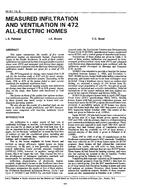An innovative seasonal ice storage technology development is followed from conception in 1976, through preliminary design, experiment, and pilot study to detailed design of a demonstration project. The objective was to develop and perfect an automated, efficient ice freezing, storage, and utilization technique with minimal operating and maintenance costs; to determine the height of ice that could be efficiently produced as a function of winter temperatures; and to develop a standard modular approach applicable at any site in a cost-effective manner. The application was to cool commercial and industrial buildings having a significant cooling demand. A construction cost goal of $150 to $200 (Canadian 1985) per cubic meter of ice was set for the system based on expected energy and chiller savings in comparison with conventional cooling techniques. This paper traces the evolution of a commercialization strategy to transfer the technology to the private sector and the changes due to technical developments and market characteristics. All of the major technical objectives have been successfully achieved. Full scale demonstration awaits less expensive design alternatives. Agricultural applications with a modified design have been evaluated over several seasons and give positive economic results. This paper follows an actual project in detail to illustrate the role of strategic aims in relation to other factors; compares the evolution of a Research and Development project in the building construction industry with the generally held view of technical innovation; and attempts to clarify the role of the government as a participant in energy Research and Development.
Units: SI
Citation: Symposium, ASHRAE Transactions, 1987, vol. 93, pt. 1, New York, NY
Product Details
- Published:
- 1987
- Number of Pages:
- 8
- File Size:
- 1 file , 810 KB
- Product Code(s):
- D-NY-87-21-1


